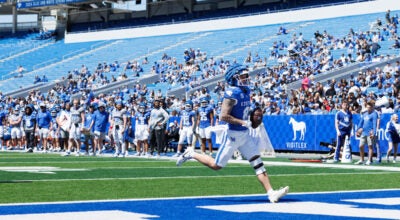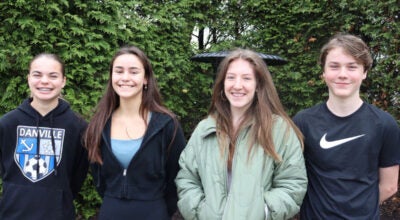Rotary learns about Kentucky School for the Deaf
Published 6:12 am Wednesday, July 25, 2018
By DAVE FAIRCHILD
Danville Rotary
Toyah Robey, KSD’s principal, gave Rotarians an entertaining overview of the most unique position she has held in her 24 years in education. “It is a privilege; an exciting and rewarding position.” That’s saying a lot, because she has been a special education teacher, a consultant and administrator with the Kentucky Department of Education and Director of Special Education.
She began her presentation with an overview of Kentucky School for the Deaf (KSD’s) nearly 200-year history of educating students who are deaf or hard of hearing from across the commonwealth. KSD was established on April 10, 1823. It was the first state-supported school of its kind in the United States and the second school for the deaf in the United States (the first school for the deaf west of the Allegheny Mountains). KSD is located on 50 acres in the center of Danville and consists of 14 buildings plus a new elementary school under construction and scheduled to open in September.
The 121 staff members at KSD are dedicated to meeting the academic, social and emotional needs of their students. The staff count is higher than comparable schools, because it is a full-time residential facility.
Federal law defines deafness as a disability requiring special education. At KSD, “deafness is a difference, not a disability.” The school is home to an average of 100 students, ranging from 92 to 108 students each year. The school program spans from preschool to grade 12. Most students live on the campus, but others travel to attend classes (generally going home for weekends; traveling by bus for up to five hours per week.)
Teaching deaf students requires different methods than those used for the general population of students. Primarily the process is visual and involves body and hand gestures referred to as sign languages. Sign languages are based on the idea that vision is the most useful tool a deaf person has to communicate and receive information.
No one form of sign language is universal. Different sign languages are used in different countries or regions. American Sign Language (ASL) is a complete, complex language that employs signs made by moving the hands combined with facial expressions and postures of the body.
At KSD, American Sign Language (ASL) is the primary learning vehicle or first language for deaf students. Spoken or written language used by the majority of the population is viewed as a secondary language to be acquired either after or at the same time as the native language. KSD utilizes a bilingual approach, to best support deaf students in receiving their education.
KSD has strong parental support and receives funding from several agencies and private charities. Kentucky School for the Deaf does not receive money from the state’s basic school funding, nor do they qualify for the state School Facilities Construction Commission funding. Instead, they rely on money from the state’s general fund. The federal government provides support through the Early Hearing Detection and Intervention (EHDI) program, which awards grants to states to develop systems to screen and diagnose hearing loss. Also, the Individuals with Disabilities Education Act (IDEA) supports and funds early intervention and special education services for children with disabilities, including deafness and hearing loss.
The Kentucky School for the Deaf Charitable Foundation (KSDCF) helps give deaf students the same cultural experiences and learning opportunities as their hearing peers. With KSDCF support, KSD students are able to use important new classroom technologies, live in improved residence hall facilities, work one-on-one with American Sign Language and English language tutors, and enjoy fantastic behavior incentives.
In addition to preparing deaf students academically to enter college or the workforce, KSD provides many venues to enrich the students’ social experiences. Primary among the social enrichment activities are competition with other schools, usually other state deaf schools. In addition to the usual school sports, KSD also has non-athletic competition. In March, 2018, six KSD students and culinary teacher Mandy Byrne won second place at the San Francisco Deaf Culinary Bowl. Seven teams participated.
KSD’s Colonels have won at least one high school eight-man football championship, in the fall of 1999. In 2007, they won the National Boys Soccer Championship and became a 12th Region contender in boys’ basketball.






